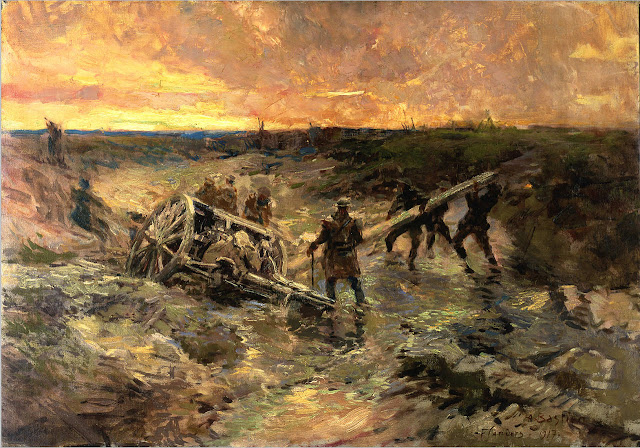 |
| Canadian Gunners in the Mud, Alfred Bastien |
The Lie About the War
By Jerrold Douglas
Faber & Faber, 1930
Conservative historian and publisher Douglas Jerrold, a man once described as "an uncompromising controversialist" [he would actively supported Franco in the Spanish Civil War], in 1930 found himself quite dissatisfied with the literature—both fictional and memoirs in the form of novels—taking the war as its subject. Jerrold had served with the Royal Naval Division at Gallipoli and on the Western Front and thus had his own strongly held views of what the war was all about.
He published a scathing volume titled The Lie About the War that grouped together such "best sellers" (which are now rated the war's "classics") as All Quiet on the Western Front, Good-Bye to All That, Under Fire, The Secret Battle, Storm of Steel, The Enormous Room, and the Spanish Farm Trilogy and described what he saw as their common and central flaw. I believe the excerpt below captures the heart of Jerrold's argument. Incidentally, in the 1950s Jerrold became better known for publishing an equally powerful rejection of the works of mega-historian Arnold Toynbee.
These books all reflect (intentionally or otherwise), the illusion that the war was avoidable and futile, and most of them reflect the illusion that it was recognized as futile by those who fought it. It is this obsession of futility, not any special depth of sympathy or humanitarianism which accounts for the piling up of the individual agony to so many poignant climaxes remote from the necessities or even from the normal incidental happenings of war. The suffering, the horror and the desolation is presented always and brutally as without a meaning so far as the declared purposes of the struggle are conceived, because these declared purposes are, to the writers and critics of the moment, either so many impudent and deadly frauds or so many irrelevancies, to the achievement of which the blunders and crimes of the military were only so many obstacles. . .
Now these writers are too gifted not to know that if the sufferings of the war were really futile and superfluous or its incidents irrelevant, the sufferings would in themselves be utterly without significance. These writers know as well as I do that the only possible tragedy of the war, considered as war, lay in its inevitability, that to deny the element of fatality must be to deny that it was a tragedy at all. Yet to accept the element of fatality would be to invest the war with a grandeur which these novelists are determined to deny it. Hence the frantic attempt to get the dramatic quality out of every kind of struggle except the struggle of one army against another and so to get a significant novel without having to admit that it was a significant war. . .
The struggle of the coward against fear, of the artist's sensibility and refinement against progressive brutalization, of the brave man against exhaustion, of the 'line' against the staff, of the amateur against the professional soldier, of the individual against authority, all lead up to and are subservient to the ultimate and wholly mendacious struggle of the man of peace against war [in Remarque's words:] "the fighting, the terror, the mastery, the power and the tenacity of the vital forces of the individual man faced with death and annihilation." To put it another way; perhaps gaining in vividness at the expense of exact analysis, the real tragedy of the war is being falsely reported as the death of so many men whose duty it was to live, whereas the real tragedy was that duty offered no alternative but death. And it was for this reason that death was accepted, not in fear, not in sullen indifference or in open or suppressed revolt, but deliberately and in the face of countless opportunities of evasion.
 |
| Purchase This Book HERE |
This is where the crime against mere veracity begins to show. To establish the dramatic quality of the secondary and sometimes wholly imaginary struggles which make up the tale of these unmilitary epics, every essential fact is falsified, either objectively or by an illegitimate technique...
A French critic [Jean Norton] has accumulated a catalogue of objective errors in some of the more popular works. I hesitate to follow in his footsteps because it is impossible to establish a negative. What is happening today is precisely what happened in 1914 in the matter of the German 'atrocities' in England and in 1919 of French 'atrocities' in Germany. A grotesque legend is being built up on a slender basis of hearsay.
Originally published in Relevance, Spring 2011

Absolute truth does not always make a best-seller.
ReplyDeleteReminds me of the end of Cather's WWI novel, where the cause of the war was just and justified the suffering.
ReplyDelete